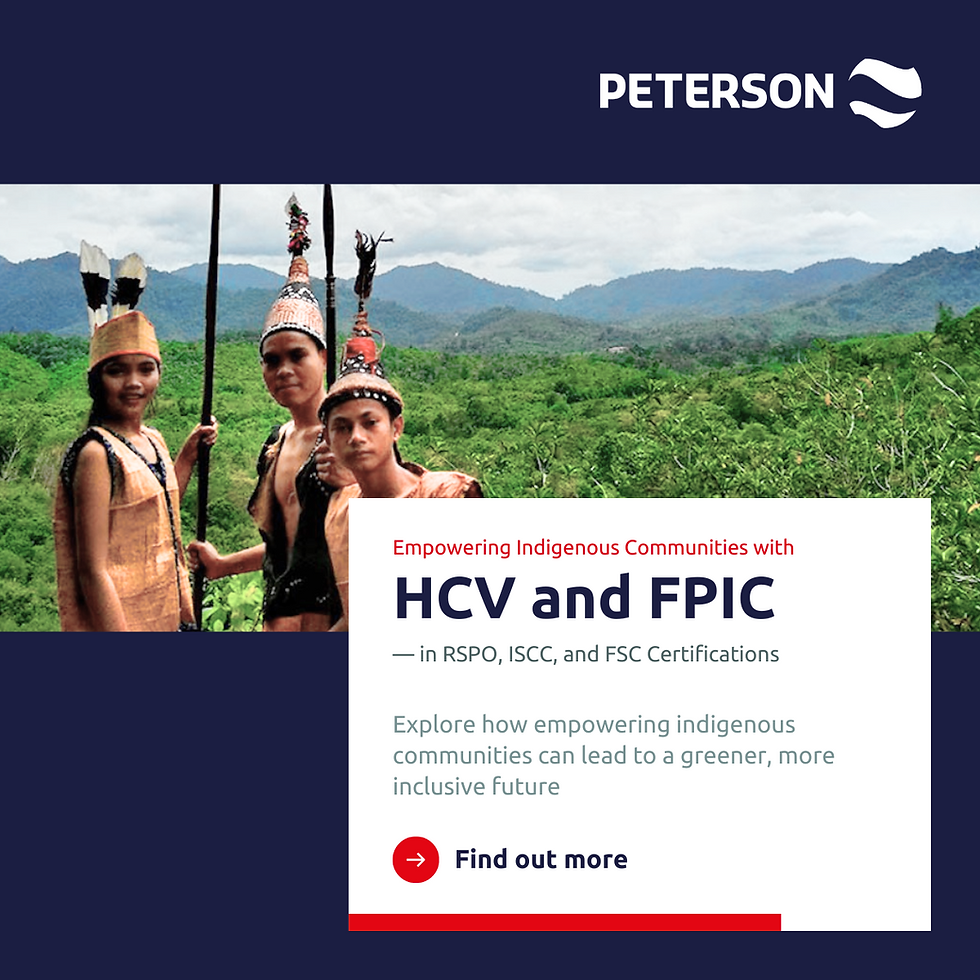HCV, FPIC, and the Role of Indigenous Communities in RSPO, ISCC, and FSC Sustainability Certifications
- Peterson Projects and Solutions Indonesia
- Dec 11, 2024
- 3 min read

Protecting Indigenous Rights with HCV and FPIC in RSPO, ISCC, and FSC Certifications
The involvement of indigenous communities is a cornerstone of sustainable development, particularly in sectors closely linked to natural resources. As stewards of ecosystems, these communities hold invaluable traditional knowledge and have long upheld a balanced relationship with their environment. To ensure their rights and contributions are respected, frameworks like High Conservation Value (HCV) and Free, Prior, and Informed Consent (FPIC) are increasingly integrated into global sustainability certifications, including RSPO (Roundtable on Sustainable Palm Oil), FSC (Forest Stewardship Council), and ISCC (International Sustainability & Carbon Certification).
Understanding HCV and FPIC
The HCV framework identifies and safeguards areas with critical environmental, social, and cultural significance. Among its six categories, two are particularly relevant to indigenous communities:
HCV 5 — Community Needs: Covers areas that are essential for the basic needs of local communities, such as sources of food, water, or livelihoods. These protections are crucial for preserving indigenous lifestyles.
HCV 6 — Cultural and Spiritual Values: This category refers to areas of high cultural, spiritual, or historical importance to communities. Protecting these areas helps maintain the heritage and identity of indigenous groups.
The FPIC principle ensures that Indigenous peoples are meaningfully engaged in decisions about projects impacting their land, resources, or rights. This principle encompasses inclusive dialogue, repeated consultations, and free decision-making without coercion. It is fundamental to ethical practices in industries such as forestry, agriculture, and bioenergy, aligning with broader efforts to achieve environmental and social justice.
Sustainability Certifications and Indigenous Rights
Sustainability certifications play a pivotal role in aligning industrial activities with environmental, social, and cultural principles:
RSPO integrates FPIC principles specifically to ensure that indigenous communities are actively involved in decisions regarding palm oil plantations. It also emphasizes the identification and protection of HCV areas before plantation development begins.
FSC promotes responsible forest management, which includes recognizing indigenous rights to land and resources while preserving cultural heritage.
ISCC, while primarily focused on sustainable biomass and carbon management, incorporates FPIC to assess the social and environmental impacts of supply chains on local and indigenous communities.
By embedding HCV and FPIC into their standards, these certifications validate a company’s commitment to sustainability and demonstrate respect for indigenous rights. This integration enhances the credibility of certified organizations in global markets while promoting equitable and environmentally sound practices.
Legal and Policy Support in Indonesia
Indonesia provides a robust legal framework for protecting indigenous rights, complementing global certification standards. Notable examples include:
Constitutional Court Decision No. 35/2012, which formally recognizes indigenous forests.
The Draft Law on Indigenous Peoples aims to further safeguard indigenous rights and integrate their perspectives into national development initiatives.
These policies underscore the importance of recognizing and empowering indigenous communities in achieving sustainable development.
The Role of Collaboration in Sustainable Development
Sustainability is a collective endeavour that requires the active participation of governments, private sectors, NGOs, and Indigenous communities. By adhering to the principles of HCV and FPIC, industries can adopt a balanced approach that integrates economic growth with environmental conservation and social equity.
Key collaborative strategies include:
Government Support: Establishing policies that align with global standards and ensuring their enforcement at local levels.
Private Sector Commitment: Investing in sustainable practices that respect the rights of indigenous communities.
NGO Involvement: Facilitating capacity-building initiatives to empower indigenous groups.
Community Participation: Leveraging traditional knowledge and engaging indigenous voices in decision-making processes.
Conclusion: A Call to Action
Indigenous communities are not just stakeholders but essential partners in sustainability. Their stewardship of natural ecosystems and unique cultural perspectives are invaluable assets in creating a harmonious balance between development and conservation.
Integrating FPIC and HCV principles into global sustainability certifications like RSPO, FSC, and ISCC is both a moral imperative and a practical step toward achieving long-term environmental and social equity. It is now up to stakeholders—from policymakers to private enterprises—to embrace this collaborative journey. By doing so, we can establish a future where economic progress and ecological integrity coexist, ensuring that both people and the planet thrive.
Comentários